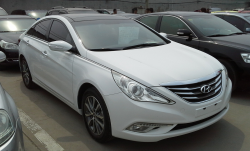
— A Hyundai Sonata class-action lawsuit will receive final approval after U.S. District Judge Beth Labson Freeman said she sees no problem with the settlement terms and believes the agreement is excellent for Sonata owners.
The Hyundai Sonata class-action lawsuit was filed by Elizabeth Mendoza, who purchased a 2011 Hyundai Sonata in 2012 and by October 2014, she started hearing a loud knocking noise coming from the engine.
A dealer told Mendoza the Sonata had a blown piston and the repairs wouldn't be covered under warranty, leaving her holding the bill of $4,500. The plaintiff says she finally had the Theta II engine replaced by an independent mechanic for $3,000.
The class-action lawsuit alleges Hyundai knew the engines were failing due to metal debris in the oil damaging the connecting rod bearings but refused to acknowledge the defects. The plaintiff claims a big reason the automaker ignores the problems is because the engines typically fail after the warranties expire, leaving owners with the repair costs.
Mentioned in the Sonata class-action lawsuit is a 2015 recall Hyundai ordered for 2011-2012 Sonata cars to repair engines problems that could cause engine fires and failures.
The recall included Sonatas with 2-liter and 2.4-liter engines that were affected by metal debris ruining the connecting rods. Hyundai said the engine crankshaft is cleaned to remove metallic debris, but if the debris is not completely removed from the crankshaft's oil passages, it can be forced into the connecting rod oiling passages and restrict oil flow to the bearings.
Those bearings are cooled by oil flow and a reduction in the flow of oil may raise bearing temperatures, increasing the potential of premature bearing wear.
A worn connecting rod bearing will make a metallic knocking noise from the engine which increases as the engine rpm increases and may also result in illumination of the oil pressure light, letting Sonata owners know there are problems somewhere. The end result will be an engine catching on fire or stalling on the road.
The 2011 Hyundai Sonata was the first Hyundai vehicle to use an engine manufactured in Hyundai's Alabama engine factory. Hyundai first used a mechanical deburring process to remove machining debris from the crankshaft but changed to a high pressure "wet blast" process to remove metallic debris.
It wasn't long before Hyundai became aware of engine-related warranty claims after owners complained about loud noises coming from the engines or about seeing the vehicle's check engine light.
The Sonata class-action lawsuit notes Hyundai initially refused to recall the cars and finally issued a recall only after pressure from the National Highway Traffic Safety Administration.
The Hyundai Sonata class-action engine lawsuit settlement will help owners in a few ways. First, the cars included in the settlement are 2011-2014 Sonatas equipped with 2-liter or 2.4-liter Theta II engines. Second, Hyundai will pay the costs for repairs or replacements of the Theta II engines and reimburse owners for rental cars and towing expenses.
Hyundai is also expanding the warranties on the cars from 5 years/60,000 miles to 10 years/120,000 miles, and if the Sonata has more than 120,000 miles on it, Hyundai will give owners 90 days to get the cars to dealerships for repairs.
Hyundai says it has already spent more than $8.5 million fixing cars as part of the class-action settlement and expects to pay much more by the end.
Not everyone is happy with the settlement terms as more than 200 Sonata owners opted out of the agreement so far, leaving those owners the right to proceed with their own legal options.
The Hyundai Sonata class-action lawsuit was filed in the U.S. District Court for the Northern District of California - Mendoza v. Hyundai Motor Co. Ltd., et al.
The plaintiffs are represented by the Gibbs Law Group LLP, and McCuneWright LLP.




